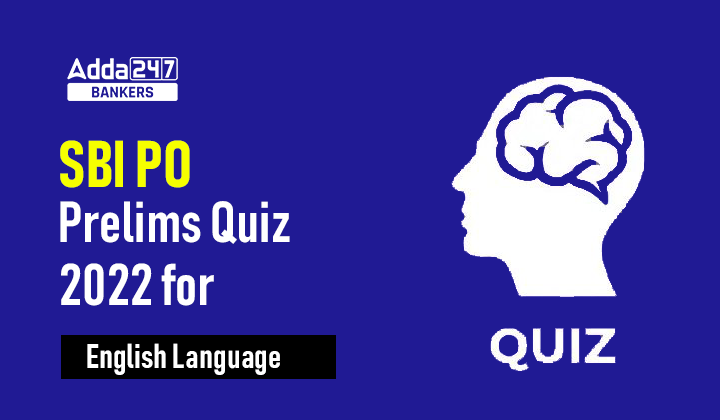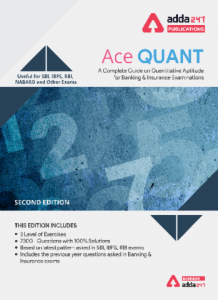Directions (1-5): Rearrange the following six sentences (A), (B), (C), (D), (E) and (F) in the proper sequence to form a meaningful paragraph; then answer the questions given below them.
(A) “It is possible” said the courtier pensively.
(B) “But I don’t understand how he can be the noblest.”
(C) The Emperor asked one of his courtier’s if it was possible for a man to be the ‘lowest’ and the ‘noblest’ at the same time.
(D) “He has been given the honour of an audience with the Emperor. That makes him the noblest among all beggars.” said the courtier.
(E) The courtier returned with a beggar. “He is the lowest among your Subjects” he said to the Emperor.
(F) The Emperor then requested that such a person be brought to him.
Q1. Which of the following should be the FIRST sentence after the rearrangement?
(a) C
(b) D
(c) F
(d) A
(e) E
Q2. Which of the following should be the SECOND sentence after the rearrangement?
(a) B
(b) C
(c) E
(d) A
(e) F
Q3. Which of the following should be the FOURTH sentence after the rearrangement?
(a) A
(b) E
(c) B
(d) F
(e) D
Q4. Which of the following should be the FIFTH sentence after the rearrangement?
(a) A
(b) D
(c) C
(d) B
(e) E
Q5. Which of the following should be the SIXTH (LAST) sentence after the rearrangement?
(a) F
(b) B
(c) C
(d) E
(e) D
Directions (6-10): Find out the error, if any. If there is no error, the answer is (e), i.e. No error. (Ignore the errors of punctuation, if any.)
Q6. We all seemed to forget (A)/ for a while that (B)/ something very strangely and terribly (C)/ had happened. (D)/No error (E).
(a)A
(b)B
(c)C
(d)D
(e)E
Q7. He is one (A)/ of the religious reformers (B)/ who has spoken out (C)/ strongly against casteism. (D)/No error (E).
(a)A
(b)B
(c)C
(d)D
(e)E
Q8. I becoming an administrator (A)/ was not liked (B)/ by my parents (C)/ and our well wishers. (D)/ No error (E).
(a)A
(b)B
(c)C
(d)D
(e)E
Q9. With his many talents (A)/ and dynamic leadership (B)/ he served his country (C)/ in commendable and lasting ways (D)/No error (E).
(a)A
(b)B
(c)C
(d)D
(e)E
Q10. He was not (A)/ a 1eader who (B)/ was desiring of making (C)/compromises with the rulers. (D)/No error (E).
(a)A
(b)B
(c)C
(d)D
(e)E
Directions (11-15): In each of the following sentences, a part of the sentence has been italicized. Below are given alternatives to the part italicized which may improve the sentence. Choose the correct alternative. Wherever no improvement is needed choose ‘No correction required’ as the answer.
Q11. We have profound faith and hopes for the future.
(a) faith for also hopes for
(b) faith in and hopes for
(c) faiths and hopes for
(d) faith about and hopes in
(e) No correction required
Q12. They can’t decide who should they blame for inefficiency.
(a) whom they should blame for
(b) whom should they be blamed for
(c) whom should they blame on
(d) whom should they blame for
(e) No correction required
Q13. Guests must register at the front desk; otherwise, they don’t obtain a key.
(a) will not obtain
(b) don’t obtained
(c) cannot obtain
(d) can obtain not
(e) No correction required
Q14. Emission controls were created to eliminate or at least reduction in air pollution.
(a) at least reduce
(b) to reduce in the least
(c) for reducing in the
(d) to at least reduction in
(e) No correction required
Q15. Because certain scientific theories are contradicting with peoples’ religious beliefs, they are reluctant to accept them.
(a) contracting to
(b) contracting with
(c) conflicting for
(d) contrary to
(e) No correction required
Solutions
S1. (a)C
Sol. The current sequence is CFEBAD.
S2. (e) F
Sol. The current sequence is CFEBAD.
S3. (c) B
Sol. The current sequence is CFEBAD.
S4. (a)A
Sol. The current sequence is CFEBAD.
S5. (e) D
Sol. The current sequence is CFEBAD.
S6. Ans.(c)
Sol. Adverb never qualifies a Noun, so replace, ‘strangely and terribly’ with strange and terrible’. [Adjective +Noun]
S7. Ans.(c)
Sol. ‘Reformers’ is a plural subject, so use ‘have’ in place of ‘has’
S8. Ans.(a)
Sol. (a) The gerundial form of verb is always preceded by the possessive case of a personal pronoun. [My/Your/His /Her/Our/ Their +V-ing]
S9. Ans.(e)
Sol. No error
S10. Ans.(c)
Sol. Replace ‘desiring’ with ‘Desirous’. Examples, He is desirous of becoming a PO.
S11. (b)
Sol. If the nouns need different prepositions, all the required preposition must be used. After ‘faith’, ‘in’ is to be used.
S12. (a)
Sol. ‘Who’ is an interrogative and a relative pronoun meaning ‘what person or people’. But ‘whom’ is the objective case of ‘who’, used as a direct or indirect object, e.g., whom did you call? As the sentence is declarative, the word order is ‘they should’ and not ‘should they’.
S13. (e)
Sol. No correction required.
S14. (a)
Sol. Parallel construction requires the verb ‘reduce’ to go with ‘eliminate’. Option (b) has ‘in the least’ which makes no sense in the context of the sentence.
S15. (d)
Sol. It is preferable to use simple present or past in such sentence conveying a general fact or view. The use of a continuous tense needs to be avoided as no action is being continually performed.





 GA Capsule for SBI Clerk Mains 2025, Dow...
GA Capsule for SBI Clerk Mains 2025, Dow...
 The Hindu Review October 2022: Download ...
The Hindu Review October 2022: Download ...
 SBI Clerk Prelims Result 2025 Out, Direc...
SBI Clerk Prelims Result 2025 Out, Direc...







